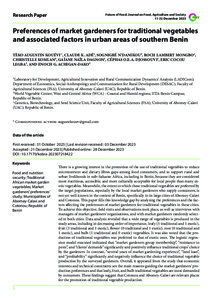| dc.date.accessioned | 2024-01-12T08:35:00Z | |
| dc.date.available | 2024-01-12T08:35:00Z | |
| dc.date.issued | 2023-12-28 | |
| dc.identifier | doi:10.17170/kobra-202307218422 | |
| dc.identifier.uri | http://hdl.handle.net/123456789/15363 | |
| dc.language.iso | eng | |
| dc.rights | Namensnennung 4.0 International | * |
| dc.rights.uri | http://creativecommons.org/licenses/by/4.0/ | * |
| dc.subject | food and nutrition security | eng |
| dc.subject | traditional African market garden vegetables | eng |
| dc.subject | market gardeners’ preferences’ study | eng |
| dc.subject | municipalities of Abomey-Calavi and Cotonou | eng |
| dc.subject | Republic of Benin | eng |
| dc.subject.ddc | 300 | |
| dc.subject.ddc | 500 | |
| dc.title | Preferences of market gardeners for traditional vegetables and associated factors in urban areas of southern Benin | eng |
| dc.type | Aufsatz | |
| dcterms.abstract | There is a growing interest in the promotion of the use of traditional vegetables to reduce vitamins, minerals, and dietary fibres’ gaps of populations and to support rural and urban livelihoods in sub–Saharan Africa, including in Benin, because they are considered as more nutritious, accessible, and more culturally acceptable for consumers than many exotic vegetables. Meanwhile, the extent to which these traditional vegetables are preferred by the target populations, and especially by the local market gardeners who are expected to supply the consumers, is not yet well-known in the context of Benin, especially in its large cities of Abomey-Calavi and Cotonou. This paper aims to fill this knowledge gap by analysing the preferences and the factors affecting the preferences of market gardeners for traditional vegetables in these cities. To achieve this objective, field visits and observations took place, as well as interviews with managers of market gardeners' organisations and with 74 market gardeners randomly selected in both cities. Data analysis revealed that a wide range of vegetables is produced in the study areas, including in decreasing order of importance, leafy (5 traditional and 1 exotic), fruit (3 traditional and 1 exotic), flower (0 traditional and 1 exotic), root (0 traditional and 1 exotic); and bulb (1 traditional and 0 exotic) vegetables. It was also noted that the production of traditional vegetables is preferred to that of exotic ones. The logistic regression model indicated that “membership in a market gardeners group”, “resistance to pests” and “clients’ demands” significantly and positively influence; while, “number of years of market gardening experience”, “loan of land allocated to gardening”, and “profitability” significantly and negatively influence the choice of traditional vegetable production by the surveyed gardeners. In all, it appeared from the study that technical constraints and economic interests are the main reasons guiding the market gardeners' production preferences and that some traditional vegetables are demanded by consumers. These findings suggest that Cotonou and Abomey-Calavi are relevant places for the promotion of traditional vegetables’ production. Further studies may, however, help find out why these traditional vegetables produced are still poorly consumed by the Benin population. | eng |
| dcterms.accessRights | open access | |
| dcterms.creator | Kouévi, Tèko Augustin | |
| dcterms.creator | Adé, Claude K. | |
| dcterms.creator | N´Danikou, Sognigbé | |
| dcterms.creator | Mongbo, Roch Lambert | |
| dcterms.creator | Komlan, Christelle | |
| dcterms.creator | Dagnon, Gaïane Naïla | |
| dcterms.creator | Djossouvi, Céphas O. E. A. | |
| dcterms.creator | Legba, Eric Cocou | |
| dcterms.creator | Achigan-Dako, Enoch Gbenato | |
| dc.subject.swd | Benin (Süd) | ger |
| dc.subject.swd | Abomey-Calavi | ger |
| dc.subject.swd | Cotonou | ger |
| dc.subject.swd | Ernährungssicherung | ger |
| dc.subject.swd | Gemüsegarten | ger |
| dc.subject.swd | Tradition | ger |
| dc.subject.swd | Gemüsesorte | ger |
| dc.type.version | publishedVersion | |
| dcterms.source.identifier | eissn:2197-411X | |
| dcterms.source.issue | No. 5 | |
| dcterms.source.journal | Future of Food: Journal on Food, Agriculture & Society | eng |
| dcterms.source.volume | Vol. 11 | |
| kup.iskup | false | |
| dcterms.source.articlenumber | 674 | |


